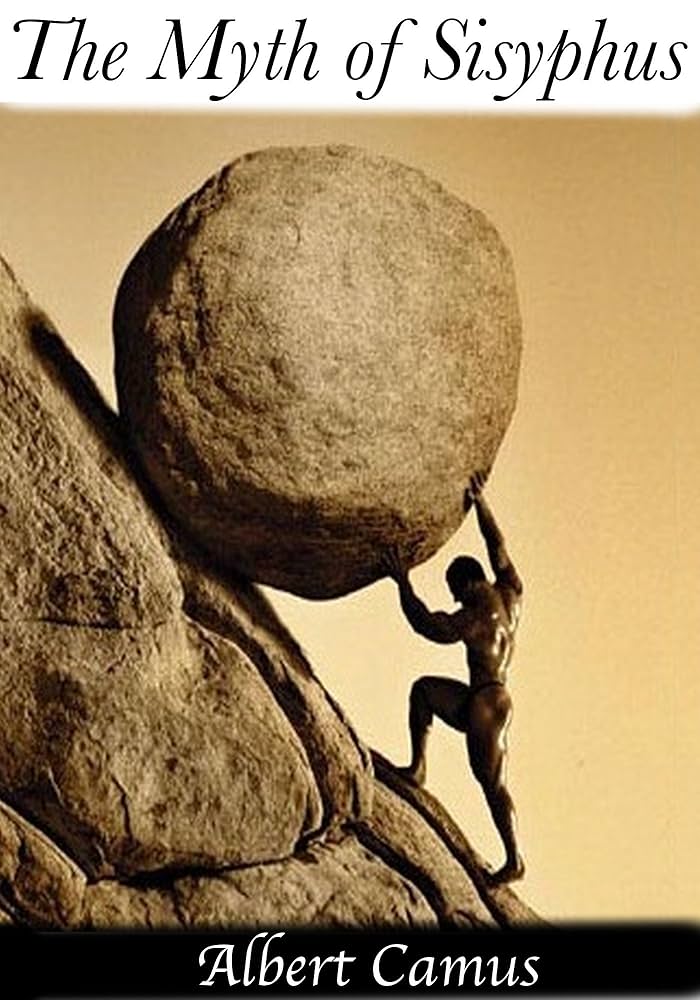
Table of Contents
Buy as E-book, Paperback, or Hard-cover
Revolt in the Face of Absurdity
Albert Camus’ The Myth of Sisyphus (1942) is a philosophical essay that opens with a jarring premise: the only serious philosophical question is whether life is worth living. This existential punch sets the tone for one of the most important works in 20th-century philosophy, exploring the concept of the absurd—the dissonance between our craving for meaning and the universe’s indifference.
In a world devoid of God, of absolute truths, or fixed purposes, Camus seeks not escape but clarity. He rejects nihilism while refusing the false comforts of metaphysical hope. Instead, he proposes a radical, elegant response: revolt. And in this revolt, he finds a paradoxical freedom.
The Absurd: Between Reason and Silence
Camus begins by defining the absurd as the confrontation between the human need for clarity and the world’s silence. We ask, “Why are we here?” and the universe responds with a shrug.
Unlike Kierkegaard or Dostoevsky, who resolve this tension through faith, Camus refuses to leap. He calls this leap a philosophical betrayal—a “philosophical suicide.” He critiques thinkers like Husserl and Heidegger for offering transcendence through abstraction or metaphysics, which for Camus only serve to dodge the raw reality of absurd existence.
Camus’ refusal to soften the absurd with consolation makes The Myth of Sisyphus a bold and unsettling work, but also a liberating one. The absurd is not a problem to be solved, but a condition to be embraced.
Suicide: The Illogical Solution
Camus does not shy away from difficult terrain. He opens the essay with a direct question: “There is but one truly serious philosophical problem, and that is suicide.”
This is not morbid sensationalism. For Camus, if life is indeed absurd, then ending it might seem logical. Yet he argues the opposite. Suicide is not a solution to absurdity; it is its refusal. It denies the confrontation. To live with the absurd, to look it in the eye and go on living, is to practice philosophical integrity.
The absurd hero, for Camus, is not the one who flees from life, but the one who affirms it without illusions.
The Absurd Hero: Sisyphus
The climax of the essay is Camus’ retelling of the Greek myth of Sisyphus—the man condemned by the gods to roll a boulder up a mountain for eternity, only for it to tumble down each time he nears the summit.
For Camus, Sisyphus is the quintessential absurd hero. His eternal struggle is devoid of hope or victory, yet he continues. He is conscious, defiant, and undeceived. In this endless labor, Sisyphus becomes a metaphor for modern man—laboring without ultimate purpose, yet choosing to live.
Camus writes the iconic line: “One must imagine Sisyphus happy.” This is not a sadistic fantasy, but a radical affirmation: happiness is possible even in a world without meaning, if one chooses lucid rebellion.
Revolt, Freedom, Passion
Camus does not merely leave us in bleak defiance. He offers a positive ethic of the absurd—a life grounded in revolt, freedom, and passion.
- Revolt is the act of saying “no” to absurdity while continuing to live fully.
- Freedom comes from understanding that without eternal purpose, we are free to create our own meanings.
- Passion means living every moment deeply, even if nothing transcendent awaits us.
These three elements form Camus’ absurd ethics, offering a mode of existence that is neither naive nor nihilistic. It is a life stripped of illusions but rich in intensity.
The Artist and the Absurd
Camus dedicates a large portion of the essay to the role of the artist. For Camus, the true absurd artist creates without hope, without appeal to higher meaning. They do not explain the world but express it.
He praises Dostoevsky, Kafka, and Proust—artists who present the world’s ambiguity without offering salvation. The absurd novel, the absurd painting, the absurd performance—all are acts of defiance, not communication. They manifest the absurd rather than resolve it.
This idea aligns closely with Camus’ later work in theater and literature, such as Caligula and The Plague, where characters wrestle with absurdity not by preaching, but by living.
Strengths and Legacy
Strengths:
- Uncompromising honesty in confronting meaninglessness
- Clear, elegant prose that balances philosophical depth with accessibility
- Practical existential ethic grounded in action, not speculation
Limitations:
- Some critics argue Camus oversimplifies the religious response to absurdity
- Others find his dismissal of metaphysics overly dogmatic
- The definition of revolt can appear thin without further development, which he later provides in The Rebel
Still, The Myth of Sisyphus has aged gracefully. Its clarity, conviction, and courage remain inspiring in a world still asking the same existential questions.
Who Should Read It?
- Readers of existentialism looking for clarity outside Sartrean jargon
- Philosophers interested in the ethics of meaning-making in secular times
- Artists, writers, and thinkers confronting creative absurdity
- Anyone who has ever asked, “What’s the point?” and waited for an answer that never came
TL;DR
The Myth of Sisyphus is not just a philosophical essay—it is a spiritual stance. In its pages, Camus outlines not how to find meaning, but how to live honestly in its absence. It is a challenge, a balm, and a clarion call to those who seek to live without resignation.
In Camus’ universe, freedom does not come from belief—it comes from revolt. And in this revolt, life becomes worth living again.
Leave a Reply